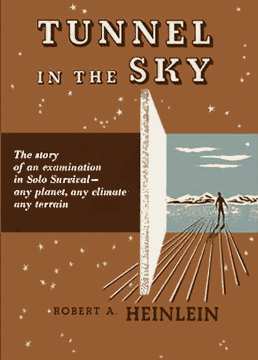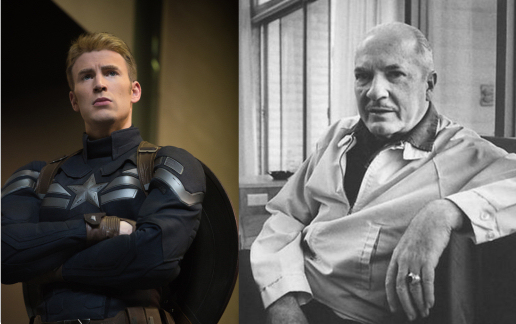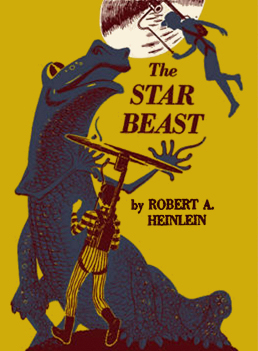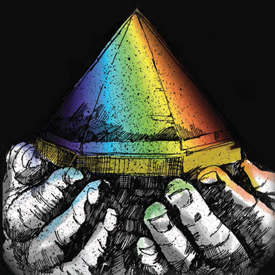After the first part of this thread about Heinlein’s YA stuff, a couple of commenters asked why I didn’t include such books as Podkayne of Mars (the heroine is obviously a younger person) or Starship Troopers. Such comments are valid to a degree, but you must remember I began by saying I was going to talk specifically about RAH’s Scribner’s “Juveniles.” Neither of the above two books was published by Scribner’s, so they’re not germane at this point. Probably, in a future entry, I’ll talk about those two books, because—whatever his faults as a writer—I loved Heinlein’s work, if not every tiny bit of it. Even as flawed a book as Farnham’s Freehold—which was very controversial when it came out, and is still controversial—had its good points.

But here, I am specifically referring to these books: Rocket Ship Galileo (1947), Space Cadet (1948), Red Planet (1949), Farmer in the Sky (1950), Between Planets (1951), The Rolling Stones (1952) (also called Space Family Stone), Starman Jones (1953), The Star Beast (1954), Tunnel in the Sky (1955), Time for the Stars (1956), Citizen of the Galaxy (1957) and Have Space Suit—Will Travel (1958).
Another comment which came up, that I thought I’d address, might have actually come from Steve Barnes’s Facebook page; Steve’s an excellent writer and, if you don’t already know, an African American person. Some of the discussions on his Facebook page concern the treatment of African Americans in film and fiction—which brings out some whopping great discussions, as you might imagine—and one particular discussion was around persons of colour as protagonists; whether one can actually write about a different ethnic group without being a member of that particular group. (Here I’m using “ethnic” to describe both racial and socio-economic/cultural heritages, in case it’s not clear.) Steve thinks it’s possible to do so; and someone suggested that in the Heinlein book Tunnel in the Sky (discussed in the last segment of this particular thread) the protagonist, Rod Walker, was an African American. That idea, since I’ve read the book numerous times since I was young, and never noticed what particular ethnic group Rod belonged to being mentioned, intrigued me. So I set out to reread the book to see if it’s mentioned, even peripherally by the character himself, the author as narrator, or any of the other characters.
I have reread the book thoroughly; there are almost no descriptions of Rod and his family in it. In fact, there are few real descriptions of anyone except Jack Daudet, and that’s a plot point; Heinlein prefers to let names (Johann Braun, for example, or Caroline Mshiyeni) give the reader a clue about the person’s ethnicity, even though he describes Caroline as “a Zulu woman.” (The people of Earth, thanks to the Gates, can live anywhere on the planet. Rod himself lives with this family in Greater New York City—on the lip of the Grand Canyon! However, when Rod finally meets his father again—three years after the story started, he notes this: “His father looked browned and healthy- but shorter and smaller.” If his father were African American, would he look “browned”? I’m guessing not. And Rod’s description at the end of the book—“…a lean, homely young man with deep lines in his face, from sun and laughing and perhaps some from worry. … He was dressed in fringed buckskin, in imitation of a very old style; he wore a Bill Cody beard and rather long hair.” Neither description seems to be of an African American male. But I could be wrong—I’d like to be proven wrong, because in my opinion, if the reader can identify with the protagonist, either by gender or ethnic description, the reader will be more “into” the story. I think here, Heinlein has managed to write a protagonist that most young men, of whatever ethnicity, will identify with.

The story in Tunnel is a bit unusual in that the only elderly male who “schools” Rod is his Survival teacher, “Deacon Matson,” and not for very long; most of Heinlein’s YA books involve an older male who teaches the young male protagonist a large number of life lessons. (Examples include Baslim in Citizen of the Galaxy, Mr. Dubois and Sgt. Zim in Starship Troopers, Jubal Harshaw in Stranger in a Strange Land, and so on. Not every book had one, but they were rife in RAH’s fiction.) Now whether the philosophy Heinlein espouses in these books—and the life lessons these older men teach—is his own, I don’t know. I think it may be, to some extent, up for debate. Certainly his political ideas were formed in a very different time from today; if you’ve seen the movie Captain America: The Winter Soldier, you can see some of the same political and moral philosophy in play with Cap himself. In Heinlein’s—and Cap’s—mind, it’s simple: there are good guys (presumably us) and there are bad guys (the “them” changes, it seems, from decade to decade)—and we should never behave like them.
Cap was a child of the ‘30s; he was a white, middle-class male in a time when worldviews, gender roles, race and class roles were, for the most part, fixed, but some of these were beginning to fray and become muddled. Heinlein was of an even older generation, really—his attitudes were formed, probably, by World War I’s aftermath, leading up to the Second World War. (By the way, William H. “Bill” Patterson Jr., author of the Hugo-nominated Robert A. Heinlein: In Dialogue With His Century, Vol. 1 (1907-1948),has just died, a month before the second volume of this biography was due to come out from Tor. Spider Robinson—a Heinlein authority and co-writer himself—has assured me that, after reading an advance copy, Patterson was due a standing ovation. Rest in peace, Bill Patterson.) But he was always a forward thinker—I haven’t read Patterson’s bio, either volume, but from what I have been able to find out, he was socially ahead of the curve in many ways. (Not that this is germane to his YA books, but he was a nudist—see The Door Into Summer—and reportedly had some fairly free ideas on sexuality as well (maybe as typefied by Stranger in a Strange Land and other books—but again, it’s dangerous to assume that a novel always reflects the author’s views).

For example, at the Kansas City Worldcon in 1976 (MidAmeriCon), Heinlein and C.L. Moore were co-guests of honour; Heinlein gave his GOH speech at the Hugo ceremonies. After being introduced, he walked on stage with a kitchen timer in his hand, and announced that it was set for a certain time—I can’t remember for sure (hey, it was darned near 40 years ago, and he was two years older than I am now), but I think it was thirty minutes—and when the timer went off he would stop speaking. (Which he did. In mid-sentence, and then he walked off the stage.) But here’s the thing—at that time he was one of the—if not THE—biggest names in SF, and during his GOH speech he announced (here I’m paraphrasing, because I can’t remember his exact words) that war was inevitable, war had always been a part of history, and we’d better prepare for the next one, because afterwards we would go back to our “traditional” gender roles: men would again become hunter/gatherers, and women would go back to tending hearth and home and child-rearing, because the next war would be an atomic war. Leaving aside how accurate his assessment of “traditional roles” was—I was reading an article reposted on Facebook earlier today by Kameron Hurley, from last year, which challenges many assumptions about gender roles in war—the salient point for me was that many of the women in the audience—led by Polly Freas and Barbara Bova, to name just two I noticed—started loudly booing this assertion.
Did Heinlein say it because he meant it or believed it? Hard to say—I think he was not above saying things for effect, whether they were accurate reflections of his beliefs or not. But the same thing applies to his fiction—he wrote strong female characters; characters like Podkayne, and Friday, and DeeTee (Deja Thoris) Burroughs—not to mention Star and a few others. (If you didn’t catch all of those, Podkayne and Friday star in their eponymous books and DeeTee is from Number of the Beast; Star is from Glory Road. I could cite others, but you get the point.) Some say his female characters were badly written, but whether they were or not is beside the point; he made the attempt to have female characters who were strong in their own right. Which kind of gives the lie to the statement about traditional roles, wouldn’t you say? (And he had a transgendered person as a main character in Time Enough For Love, which makes him one of the earlier SF writers to do so.)

All that is not really germane to the subject of Heinlein’s YA books, perhaps. Because the column I had originally written most of got lost yesterday when the power went out for six hours—yes, foolish me, I get on a roll typing and forget to hit “save” sometimes—you can bet I’ve saved this one about every ten minutes. (Power outages are kind of uncommon around here, especially when there is no weather—like high winds—to account for them.) So what I was saying about the YA books kind of got lost in the shuffle; the Heinlein politics kind of got expanded. I can always come back to the YAs—and I intend to, next week. A couple of them, like The Star Beast, although maybe a bit weaker, are perennial favourites with young people. (Never mind that science has kind of invalidated the popular view of Venus that was held in the ‘forties and ‘fifties.)
So, because my deadline is here, I will leave this discussion until next week; I hope that some of what I’ve written might cause you to look at Robert A. Heinlein in a different light if you share the popular view that he’s somehow warlike. He advocated preparation for war, I’ll give you that. Even his YA books stressed that people should prepare for life; and he held that war was an historical part of life. But he didn’t ever advocate war, as far as I know. I will conclude this look at Heinlein’s Scribner’s YA books next week.
Comments on this week’s entry are always welcome. To comment, you can either register here—it’s free, and it only takes moments—and comment, or you can comment on my Facebook page, or in the several Facebook groups (FAANEDS, etc.) where I publish a link to it. All comments—positive or not—are wanted and welcome! Feel free to disagree; my opinion is, as always, my own, and doesn’t necessarily reflect the views of Amazing Stories or its owners. See you next week!











What I loved most about Belle was her humor… both her character’s craziness and off-kilter way of viewing the world, revealed in this passage from the book, and Heinlein’s appreciation of how nutty she was. This passage from the book sums up her philosophy. This, after she’s just injected Dan with a drug that may or may not make him do whatever she wants:
‘”Damn it, you told me this drug was sure-fire.”
“Good God, Chubby, you have to take chances with everything in life. That’s what makes it fun. Let me think.”‘
And in her later years, this bit, when she’s trying to re-seduce Dan when he sees her after three decades apart,
“Let’s forget everything and just be ourselves. There’s just you and me now, dear… and we still have our lives ahead of us. A woman isn’t old at thirty-nine: Schultzie said I was the youngest thing he ever saw-and that old goat had seen plenty, let me tell you! We could be so happy, dear. We–“‘
(The above when her character was in her mid to late sixties.) (Heinlein seemed to love writing unrepentant scoundrels, maybe because they revealed the truth, sometimes unintentionally, even more-so when, like Belle, they were speaking garbled and transparent lies.) (She was self-delusional in a literarily wonderful way.)
My favorite Robert Heinlein female is Belle Darkin in “The Door Into Summer.” He does a great job of portraying her when we first meet her, when she’s in her mid thirties, then revealing the person she’s turned into thirty years later, when the protagonist meets her again after spending three decades in suspended animation.
Belle is beautiful, brilliant, manipulative, conniving, and thoroughly corrupt — and funny as hell. (At the age of 65 or thereabouts, she tries to convince the protagonist, who knew her thirty years previously, that she’s only 39 — and seems to believe it herself.) She’s one of the most interesting, complex characters of either gender that RAH created. It’s evident that he had great fun imagining her. (An old girlfriend of mine, an actress, once said that she would have loved to have played a character like Belle on stage, she was so funny and there was so much to her.)
Thanks for this take on Belle, Nils. You’re right–she’s not a likeable character; in fact, she’s probably the main “evildoer” in the book, as she works in self-interest only, with no thought for what others might feel. I appreciate the thought and the comment.
Congratulations on your Aurora nomination, Steve. Well done!
I am reminded, by Alan Bard Newcomer, that Word–as many other programs–has Autosave. I hate Autosave. I refuse to use it; I’ve had autosave screw me up many times in the past. If I forget to save it’s on my head–as happened above. I accept that.
Yes, Alan, Writers of the Lost, Ink was in Edmonton. I miss our weekly discussions and writing challenges. There and in the Writers’ Bloc of Moscow, Idaho.
Captain America is most emphatically not “middle class”. It’s made quite clear in the movie that he’s respectable big-city working class by background, probably Irish-American ethically (his best friend certanly is).
Urban-ethnic, in other words.
People in his neighborhood work on the docks or drive busses with a leavening of small shopkeepers, school teachers (mostly women) and secretaries and the like.
Nevertheless–I, and my family, are also “working class” people, and I feel we are firmly in the lower middle class. My father retired from the Air Force, I joined the Navy–and nobody in my family ever got rich. Ever! We weren’t urban or big-city working class; we went wherever the Armed Forces put us.
I still feel like we’re middle class. So go ahead, diss us working people!
But thanks for the comment… sometimes we say things that seem right to us, but not to others. I’m not sure where the class lines fall, but I never felt myself–as working class–in any way less than the middle class!
There’s nothing wrong with being working-class — a lot of my family were. It’s an objective, descriptive term, like “farmer”, not a perjorative.
It’s only after WWII that people started treating “middle class” as a description of everyone except the very poor and very rich.
It’s become common now, but it’s sort of dumb in my opinion and definitely less accurate as a description of how society is organized than the older set of terms — upper class, upper middle class, middle class, working class and the “the poor”.
In the 1930’s, when Captain America grew up, that tendency to call nearly everyone ‘middle-class’ had hardly started.
The term most commonly used at that time for people like Cap (or my father-in-law, who worked in a foundry before WWII, or my wife’s foster-father, who was a quarryman) was “workingman”. Working-class would have been used by bureaucrats, academics and lefties.
Anyone who worked with their hands or had a non-manual job that paid below a certain level of income, particularly if payed hourly or on piecework rather than salary, was a workingman or working-class.
That would have been a majority of the population. Enlisted personnel in the armed forces were viewed as workingmen or working-class, at least before the WWII draft hoovered up 14 million people.
There was a broad band of uncertainty between workingmen and the lower middle class, of course; a steelworker was definitely working class, a stock-clerk not necessarily, though when in full-time work most steelworkers made more.
Military officers would be middle class; ditto doctors, other professionals, small to medium businessmen, and some varieties of white-collar worker.
Well, that’s good to know. Even I, as a baby-boomer (born in the late ’40s) wasn’t aware of this, so I think a lot of our younger readers would be interested in this.
As Stan Freberg would say, “Ah ‘preciate this. Ah ‘preciate it!”
Oh yes, I just remembered! Until I joined Writers of the Lost Ink in Edmonton in (I think) 1988, I had only read perhaps three books by Heinlein. Your group, Steve, inspired me to read everything Mr. H wrote and I am glad I did. Thanks.
These books my perennial feel-good reading. I revisit most of the juveniles almost once every years. My personal favorites are Rocketship Galileo, Starman Jones, Time for the Stars, Tunnel in the Sky, and Farmer in the Sky. I found that, over successive readings, I grew to like Farmer while my interest in Have Spacesuit and Citizen waned a little.One of the really stellar things I notice about the juveniles is that each has a unique theme that is important to teenagers–In Rocketship: being recognized for one’s talents, in Starman: facing unfairness, Time for the Stars: becoming an individual, Tunnel: leadership, Farmer: community, etc. Heinlein had no simple formula. Of all his work, I admire this body of work the most.
PS: sad to hear about Bill Patterson. I enjoyed listening to him on panels at Heinlein Centennial con and I enjoyed volume one of the bio.